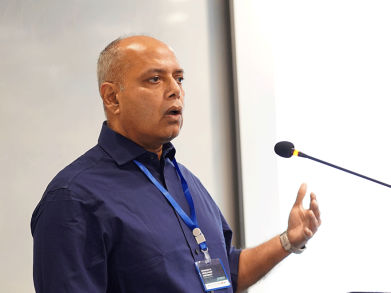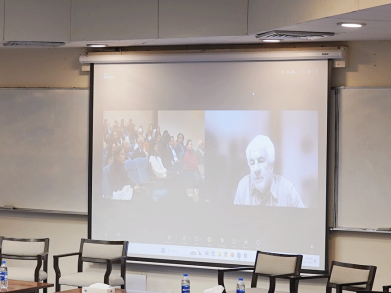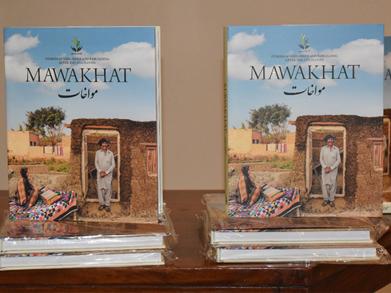LUMS Students Talk Changes and Challenges in the Time of Corona
If you walked past the LUMS khoka on the evening of March 13, 2020, you would be greeted by swarms of students relaxing and enjoying the crisp spring air. Together, friends joked and laughed, blissfully unaware that in just a few short hours the Higher Education Commission, Pakistan would announce the closure of all institutions in an effort to avoid the spread of COVID-19. They had no way of knowing that in a matter of weeks, gathering in a public space without a face mask or a cautious distance would become unthinkable. Further still, they could not have predicted that this may be the last time they gather on campus for a very long time.
The impact of the University’s closure for students was direct and immediate. Within a very short time, they had to adjust to a new normal and deal with the challenges of moving online. Two members of the LUMS Student Council, Talha Bin Ejaz, BSc 2020, and Zuleikha Adnan, BA-LL.B 2023, candidly share their experiences about dealing with the lockdown and moving so much of their life, including classes, online.
As they come to terms with what may well be the new way of life for the foreseeable future, Talha and Zuleikha reflect on the merits and drawbacks of going virtual. The most difficult aspect has been making peace with the fact that they didn’t see it coming. As they reminisce about their last evening on campus, they wonder if they should have spent that time saying fond farewells to their friends instead.
For Talha, as a graduating senior, the situation is even more emotional. Any future visit to LUMS will be as an alumnus; the graduation tassel firmly on the other side. “If I had known the University would be closed for so long, I would have said a proper goodbye to my roommate, my favourite cashier at Jammin Java Café, my favourite security guard…all the members of the LUMS community who I have such a strong bond with,” he says.
After an extended spring break, although the campus did not reopen, classes resumed virtually. Online sessions weren’t always easy to undertake, and the unfamiliarity of it all was just one of the issues students needed to navigate. Zulekha and Talha weighed in on the pros and cons of e-learning and the idiosyncrasies that come with it. They talk about becoming familiar with the background noises that would accompany an unmuted mic: sounds of a classmate’s milkman, or wailing babies in the distance became commonplace. Everyone made an unspoken pact to do the decent thing: pretend that they just didn’t hear anything unseemly.
One of the most common issues for students was connectivity; Wi-Fi access was not always stable, particularly for those based in northern regions of the country. In addition, power outages were common. As a result, in order to be fair to those who could not join live classes, many instructors opted not to mark attendance. Recordings of lectures were also made available so students could easily refer back to the material. “The professors were very accommodating, so in that respect the experience was good. They worked very hard to tailor the classes for us,” says Talha.
Interestingly, although classes did not physically convene, the students still felt the familial bond with their instructors. Talha fondly recalls moments where his professor knew exactly when he was struggling, even though his mic and video were off. He says, “Instructors are like parents. They know their students no matter what.”
Motivation seemed to be a persistent hurdle while studying online. Both students attribute this to a combination of factors – the most prominent being the monotony of spending their entire days in front of a computer screen.
Talha echoes a similar sentiment and says, “I just didn’t have the same motivation online. At LUMS, I would walk all the way across campus from my dorm to the Business School for an 8 am class. At home, the distance from my bed to my laptop felt too much!”
Understandably, the variety of a physical classroom environment helps keep students active and alert while in session. Zuleikha astutely notes, “One’s mood has a lot to do with how much you learn. On campus, just greeting your professor in an early morning class would energise you. Meeting your friends in between classes, joking with your classmates…these are all things that keep you happy and encourage your learning. At home, we may have the necessary tools and facilities available to us, including coffee and snacks. But at the end, it’s just you, your laptop and your four walls while you’re studying alone. No amount of tea seems to energise you the way a break on campus used to.”
Zuleikha also shares how online learning can give rise to a sense of formality between people and lead to less open dialogue. “On campus, I always felt confident to participate and speak up in class. Even though I had the exact same people in my online class that I had in my normal sessions, I suddenly felt shy and afraid to say the wrong thing. As a result, I would often stay quiet.”
Noting the ‘raise hand’ feature on Zoom sessions, Zuleikha observes, “Everything has to be planned. You have to announce your intention to speak and wait for your signal to be recognised. By the time it’s your turn, your point or comment may no longer even be relevant.” She concludes, “I miss the spontaneity of a classroom environment. A natural discussion just doesn’t happen online.”
However, there are aspects of e-learning that are more favourable than the traditional model. “Exams are so much simpler to deal with. The exam hall scenario is much more tense! You nervously enter the room, check your roll number…there is just so much anxiety. This time, I was able to take my exam as an assignment and just work at it quietly at home.”
The ongoing pandemic may require teaching and learning activities to continue virtually for the foreseeable future. While discussing the prospects of an online Fall semester, the students are far more prepared than before and hold a positive outlook. “Online classes can be fun. It just took us a while to wrap our heads around the idea and come to terms with it,” says Talha. For incoming batches, he has some sage advice, “Make sure you set a good routine for yourself, work in groups and be innovative!”






















